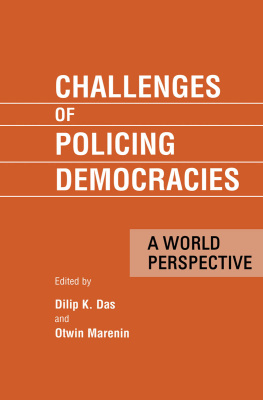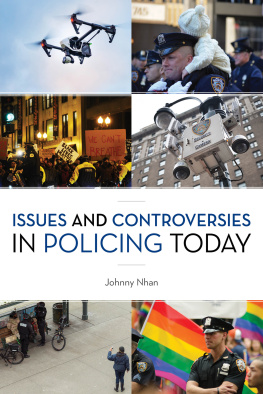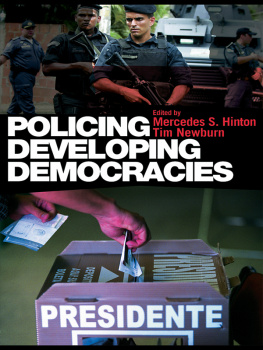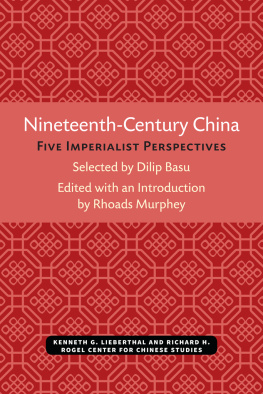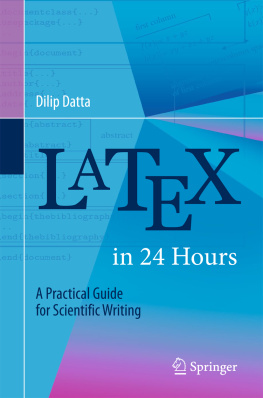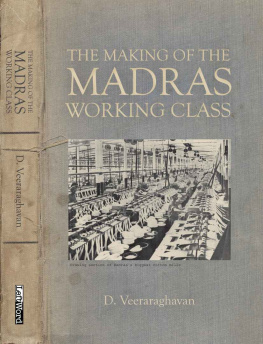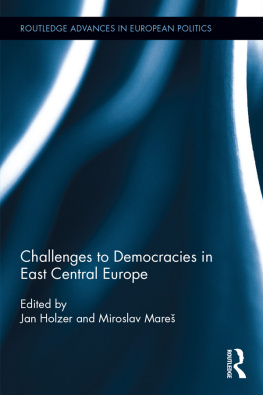Challenges
of Policing Democracies
A World Perspective
Edited by
Dilip K. Das
State University of New York
at Plattsburgh, NY, USA
and
Otwin Marenin
Washington State University
Pullman, WA, USA
Gordon and Breach Publishers
Australia Canada France Germany India
Japan Luxembourg Malaysia The Netherlands
Russia Singapore Switzerland
Transferred to Digital Printing 2005
Copyright 2000 OPA (Overseas Publishers Association) N.V. Published by license under the Gordon and Breach Publishers imprint.
All rights reserved.
No part of this book may be reproduced or utilized in any form or by any means, electronic or mechanical, including photocopying and recording, or by any information storage or retrieval system, without permission in writing from the publisher.
Amsteldijk 166
1st Floor
1079 LH Amsterdam
The Netherlands
British Library Cataloguing in Publication Data
Challenges of policing democracies: a world perspective
1. Police power Political aspects 2. Police administration Political aspects 3. Police Public opinion Political aspects 4. Democracy
I. Das, Dilip K., 1941 II. Marenin, Otwin 362.23
ISBN 90-5700-558-1
ISBN 978-1-136-64816-8 (epub)
FOREWORD
This volume is based on a series of papers presented at a symposium held in May 1995 at the Oati Sociology of Law Institute in Spain. Participants from fifteen countries, mostly European, met to discuss perceived global challenges of policing democratic societies during a decade of dramatic geo-political change.
Nowhere was this change more evident than in Eastern Europethe region represented most extensively at the symposium by participants from Estonia, Hungary, Poland and the Russian Federation. From the Balkans, still reeling from the bloody conflict arising from the disintegration of the former Yugoslavia, came representatives from Macedonia and Slovenia, while the strife torn regions of the Middle East had a single representative from Israel. The continents of South America and Africa were represented singlythe former by a participant from Chile and the latter by a participant from South Africa. Both Chile and South Africa remain nations emerging only recently from long periods of rule by brutal and repressive regimes.
To complete the mix of nations participating at the Oati symposium were representatives from Austria, Switzerland, The Netherlands and the United Kingdomall European countries with established democracies but still possessing a rich diversity of legal, political, cultural and allied traditions. In the case of three of these countriesAustria, The Netherlands and the United Kingdomthese traditions have the additional and shared overlay provided by their respective membership in the European Union.
In his introduction to this book, Professor Dilip Das has referred to the conceptual dilemmas encountered in any international gathering of this type at which the participants possess such varied backgrounds and experience regarding the topic under review. The two principal concepts being consideredpolicing and democracycontain sufficient room even within a single society for extensive dialogue and debate about their content and meaning, let alone among the sixteen representatives at Oati. Not surprisingly, no common understanding seems to have been reached about the definition of these concepts at Oati, but the discussion flowing from the symposium, which is now reflected in this book, provides valuable insight and guidance for anyone seeking to advance policing within the context of democratic principles.
Considerable attention has already been given, principally at the level of the United Nations, for the development of common norms and standards of law enforcement including the use of force, the handling of juveniles, the prosecution of suspects and the treatment of offenders. The translation of these norms and standards into specific policing practices and procedures adopted by each of the member states of the United Nations remains a matter of ongoing concern. The Oati symposium papers identify many of the difficulties being encountered along the road to reform in the area of law enforcement. Professor Das has expanded these policing reform dilemmas under three principal headingsorganizational, operational and professional. A similar approach is adopted here.
The organizational challenges for policing which confront nations in a state of transition to democracy continue to be formidable. These challenges are not confined usually to settling upon and putting in place a desired structural model for policing. Frequently, they extend to the design and implementation of an entirely new justice system. Policing reform can be quite meaningless if it leaves untouched former criminal laws and procedures used to maintain a non-democratic regime in power. Sweeping away an entire justice system of this type and replacing it with one which both espouses and operates according to democratic principles is a complex and time consuming task. In South Africa, for example, it is a task which has been encompassed as part of a process of drafting and passing into law a new constitution for the country, and the entrenchment within that constitution of a bill of rights. The process continues with public hearings before a National Truth and Reconciliation Commission to allow those who committed crimes in the past to seek atonement for their misdeedsand reintegration into South African society. This Commission has already dealt with many cases involving current members of the South African police responsible for wrongdoing under the former apartheid regime.
Operational concerns also place significant obstacles in the path of policing reforms within nations experiencing radical change, such as South Africa. For example, the significant growth in organized crime which afflicts contemporary South Africa, and to an even greater extent the Eastern European nations, is well documented. So too is the troubling growth in violence associated with much of this criminal activity. There have been major and related shifts of populations across national boundaries as people seek to flee from the brutality and hardships of their own societies to safer and more prosperous havens. Much of this movement of people has occurred in Europe, exerting great stress upon the humanitarian and liberal principles espoused by Western European democracies and leading to calls for more repressive policing measures to combat illegal migration. Similar developments have occurred in the United States where the surge of economic migrants from Latin America and elsewhere continues to be a significant problem for United States law enforcement officials.
Many professional challenges to policing reform were also identified by the Oati symposium participants. Foremost among these were various forms of police deviance, including the excessive use of force and corruption. Such deviance is certainly not limited to police in nations undergoing a transition to democracy. The pressures and temptations to behave in violent and corrupt ways are, however, no doubt more compelling and explicable in a society where in the past the police were required to act as the repressive bastion for non-democratic and corrupt regimes. Quashing such police misconduct and replacing it with acceptable and lawful behavior requires much more than the introduction of a code of ethics and like provisions. Much of the deviance exhibited by the police mirrors that which continues to be displayed by ruling elites in the new democratized societies they now serve. Rooting out this deeply entrenched corruption remains a serious problem and a significant threat to the long term viability of many of the supposedly democratic governments established over recent years in Eastern Europe and other parts of the world.

